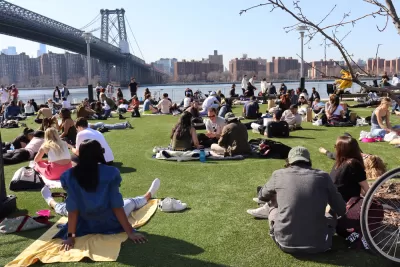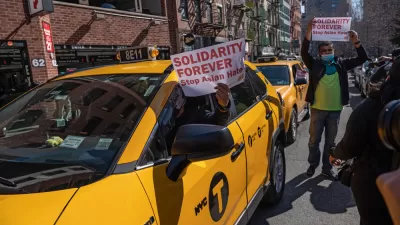Planetizen started gathering articles attempting to predict the post-pandemic future in March 2020. The work goes on, with many questions left still to be answered.

The number of articles, opinions, and analyses published in the past 14-plus months on the consequences of the COVID-19 pandemic for the future of cities and communities has required a different approach from Planetizen's normal daily posts. As I mentioned in the April 2021 edition of this series, uncertainty is at the root of this outpouring of interest and prognostication. Most of us alive today have never faced the kind of uncertainty we have endured for the past year.
- Light at the End of the Tunnel Reveals the Work to Come (April 2021)
- 'Never Let a Good Crisis Go to Waste' and Planning in the Pandemic (March 2021)
- Haves and Have Nots: Planning and the Deep Divides of the Pandemic (February 2021)
- Density Takes Center Stage in the Pandemic, Again (January 2021)
- Nine Months Later: How the Pandemic Is Changing Communities (December 2020)
- Coronavirus and the Future of Cities: A Final Pre-Election Tour of the Issues (November 2020)
- Do We Know Any More About the Future of Cities Than We Did in April 2020? (October 2010)
- The Media Can't Stop Talking About the End of Cities (August 2020)
- The Great Debate: Will the Pandemic Alter the Course of Urbanism? (July 2020)
- Debating the Future of Cities After the Coronavirus, Volume 3 (June 2020)
- Density Debate Rages Alongside the Pandemic (April 2020)
- Debating the Future of Cities, and Urban Density, After the Pandemic (March 2020)
- Coronavirus and Urbanism (Planetizen Tag)
- Coronavirus and Transportation (Planetizen Tag)
- Coronavirus and Density (Planetizen Tag)
I wish I could say that on the precipice of a second pandemic summer, with the number of vaccinated in the country slowly inching toward a majority, that we know more about how the pandemic will alter the way we live, work, and recreate, but it's clear from this month's compendium of articles on the subject that some of the biggest questions of the pandemic are still unanswered.
Questions like: What will happen to the millions of renters and property owners who struggled to pay the bills while economy shut down for much of the year? Will enough transit riders return to buses and trains to stabilize transit system budgets? Will an "urban exodus" create millions of new car owners and miles and miles of outward development pressure? Will space created for walking and dining be ceded to the cars that previously occupied those spaces? How many people will return to work in central business districts? Can the field of planning analyze and respond the current crises in regenerative ways that also help prevent future crises (like climate change)?
After an initial wave of daring (perhaps foolhardy) certainty from some pundits working in the urbanism sphere, it seemed like the appetite for speculation declined for much of the shockingly long duration of the pandemic. Back at the beginning, there was always a side of wishful thinking and projection served with the prognostication entrée, but maybe there's a more positive way to think about it now. The continued uncertainty of the pandemic also reveals the rare scale of the opportunity to move in a different direction. While there is still a lot of disagreement about the right or likely path forward, the continued uncertainty about the consequences of the pandemic continues to provide an opportunity to advocate and work for a healthier, more prosperous future.
Worst case and less-than-best case scenarios are still in play, unfortunately. If the Great Recession is any guide, we will learn some lessons from the pandemic far too late. Planetizen continues to publish these compendia in the hopes that the field of planning will make some sense of all this information sooner rather than later and find a way to be a proactive and positive force in the post-pandemic future.
The Real Estate Market the Pandemic Built
- Developers Plow Ahead With Ambitious to Reshape City (Bloomberg, April 19)
- How Covid Transformed New York City’s Housing Map (Bloomberg CityLab, April 20)
- 2020 Atlanta renter data show influx of people from suburbs, NYC, Chicago (Urbanize Atlanta, April 20)
- Bay Area COVID migration may be slower than expected (The Mercury News, April 20)
- GM reveals plans for employees, offices post-COVID-19 (Detroit Free Press, April 20)
- Downtown D.C. was emptying before the pandemic. How it recovers will shape the nation’s capital. (The Washington Post, April 20)
- Could Your Empty Office Turn Into Apartments? (Slate, April 20)
- City living lost some appeal for condo hunters during the pandemic (The Boston Globe, April 21)
- A year into the pandemic, metro Atlanta’s real-estate and development industry is damaged, uneven, relatively strong, and absolutely killing it (Atlanta, April 21)
- Building Back? Richard Florida outlines his vision for a ‘post-pandemic city’ (The Architect' Newspaper, April 26)
- The Pandemic Changed Where Americans Live (The Wall Street Journal, April 27)
- The WFH Exodus Creates an Opportunity for Small Cities (Wired, April 29)
- The remote work revolution is transforming, and unsettling, resort areas like Lake Tahoe (Los Angeles Times, April 30)
- New Towns and the Struggle for Work-Life Balance (American Planning Association, April 29)
- NYC's Financial Condo District condos pile up as office life retreats (Crain's New York Business, May 6)
- The Breakout Cities on the Forefront of America’s Economic Recovery (The Wall Street Journal, May 9)
- America’s Post-Pandemic Geography (City Journal, May 10)
- How Covid changed the way Australians move: more traffic jams, less public transport (The Guardian, May 17)
- Manhattan’s Apartment-Vacancy Rate Is Stubbornly High (May 20)
- Colorado Renters And Landlords Are In A Race With The Eviction Ban. Should The State Intervene? (Colorado Public Radio, May 24)
Transportation Stress
- Surrendering Our Cities to Cars Would Be a Historic Blunder (The Atlantic, April 16)
- COVID recovery: BART could put fare hikes on hold (The Mercury News, April 20)
- RTD retained more frequent service during pandemic in communities that need transit the most (The Denver Post, April 21)
- Public transit hopes to win back riders after crushing year (Associated Press, May 1)
- Here’s where people are riding Metro this spring (Greater Greater Washington, May 6)
- Arvada extends its downtown street closures for five years (Denver Business Journal, May 10)
- Where Covid’s Car-Free Streets Boosted Business (Bloomberg CityLab, May 11)
- Working From Home for Some Threatens Mass Transit for All (Bloomberg CityLab, May 12)
- After showing its worth during pandemic, momentum builds for free or reduced-fare transit (The Washington Post, May 17)
- Afternoons Are the New Rush Hour in the Suburbs (The Wall Street Journal, May 17)
- Philadelphia needs to manage the return of the car as the pandemic subsides (The Philadelphia Inquirer, May 24)
Work Work
- Most Americans Would Take a Pay Cut to Keep Working From Home (Slate, April 27)
- How to help 2.3 million New Yorkers build back better (Crain's New York Business, April 29)
- ‘We’re Suffering’: How Remote Work Is Killing Manhattan’s Storefronts (The New York Times, May 2)
- Amid restaurant closures in Boston, there is an opportunity to reshape the city's dining scene for years to come (The Boston Globe, May 8)
- What pre-pandemic job trends suggest about the post-pandemic future of the capital region (Brookings, May 12)
- Denver's downtown workforce won't look the same after COVID. And cities aren't stressed. (The Denver Post, May 19)
- If workers don’t return to downtown Denver, what will its post-pandemic future look like? (The Denver Post, May 20)
Status Check
- The Impact of Coronavirus on US Job Postings Through April 23 (Indeed, April 27)
- New York City Is Roaring Back to Life, One Year After Its Nadir (Bloomberg Wealth, May 1)
- Tech Jobs Lead the Way in New York City’s Covid-19 Pandemic Hiring (The Wall Street Journal)
- We shouldn’t go back to “normal.” Normal wasn’t good enough. (Vox, May 12)
- In Reversal, Retirements Increased During the Pandemic (The New York Times, May 12)
- New York Is Dead. Long Live New York. (The New York Times, May 15)
- The black box economy (Vox, May 17)
- The 2021 RPA Assembly Highlights Post-Pandemic Solutions for Built Environment (RPA Lab, May 19)
- Pandemic population change across metro America: Accelerated migration, less immigration, fewer births and more deaths (Brookings, May 20)

Planetizen Federal Action Tracker
A weekly monitor of how Trump’s orders and actions are impacting planners and planning in America.

Maui's Vacation Rental Debate Turns Ugly
Verbal attacks, misinformation campaigns and fistfights plague a high-stakes debate to convert thousands of vacation rentals into long-term housing.

San Francisco Suspends Traffic Calming Amidst Record Deaths
Citing “a challenging fiscal landscape,” the city will cease the program on the heels of 42 traffic deaths, including 24 pedestrians.

Defunct Pittsburgh Power Plant to Become Residential Tower
A decommissioned steam heat plant will be redeveloped into almost 100 affordable housing units.

Trump Prompts Restructuring of Transportation Research Board in “Unprecedented Overreach”
The TRB has eliminated more than half of its committees including those focused on climate, equity, and cities.

Amtrak Rolls Out New Orleans to Alabama “Mardi Gras” Train
The new service will operate morning and evening departures between Mobile and New Orleans.
Urban Design for Planners 1: Software Tools
This six-course series explores essential urban design concepts using open source software and equips planners with the tools they need to participate fully in the urban design process.
Planning for Universal Design
Learn the tools for implementing Universal Design in planning regulations.
Heyer Gruel & Associates PA
JM Goldson LLC
Custer County Colorado
City of Camden Redevelopment Agency
City of Astoria
Transportation Research & Education Center (TREC) at Portland State University
Jefferson Parish Government
Camden Redevelopment Agency
City of Claremont





























